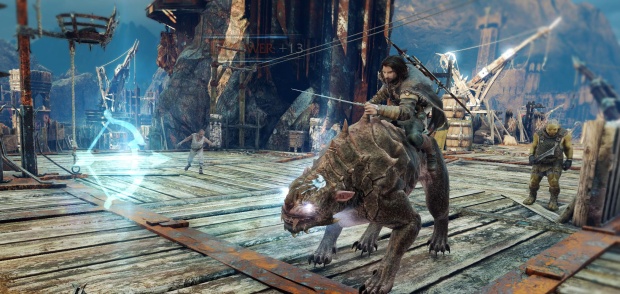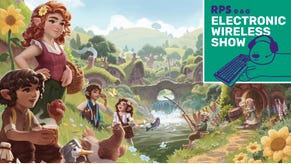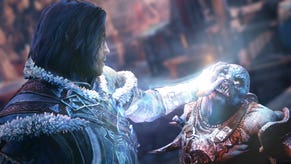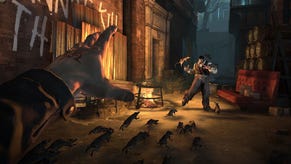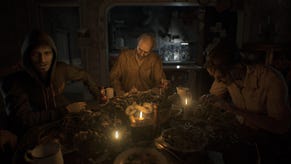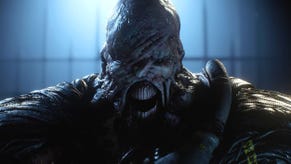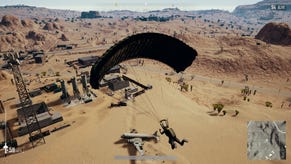The RPS Verdict: Middle-Earth - Shadow Of Mordor
Lend Us Your Boromir
MOOOOOORRRRRRRRRDDDOOOOOOOOORRRRRRR, is the primary form of communication about Monolith's Middle-hyphen-Earth: Shadow Of Mordor. However, we managed to break free of this trapping, and instead converse about the game in ever-so-slightly more erudite form. Below Jim, Alec and John have a natter about orc killing matter.
Alec: Who is the real monster - Sauron, or the guy who murders eighty orcs every minute?
Jim: One orc death cam is a tragedy, 10,000 orcs killed in a big CG battle a statistic, etc.
John: My rule: if you stand dead still, will they hit you first? THEN YOU ARE THE GOODIE!
Jim: And in the game.
John: Oh, I guess it does apply to games.
Alec: What if you've previously hypnotised them into doing your bidding?
Jim: Are we talking about the game now?
John: How much Shadows Of Mordor have you two played?
Alec: I'm a way into the second area, which has grass and hypnotising.
Jim: I've only played a few hours, sadly, but it's a few hours that I will continue with.
John: I've finished it, because I'm best.
Jim: Show off.
John: I AM THE KING OF THE ORCS.
Jim: OMG spoilers!
John: (I'm not the king of the orcs, that isn't really a thing.)
Jim: OMG spoilers!
Jim: So what is That Shadow of Mordor, then, John, if you're so clever?
John: The Shadow Of The Mordor is a game that adds a bridging story between The Adventures of Mr Hobbit and The Ring Lord Trilogy. You play a man who is dead, but then alive again, with a wraith stuck in his head. You kill orcs.
Alec: Why is it that you intend to continue with it, Jim? After all, there are no robots or miserable irradiated Russian men.
Jim: Basically I like stealth, but I like stealth in open world systems even more, so it's the perfectest Lord Of The Rings game there ever has been, for me.
Alec: Interesting - I don't really think of it as a stealth game now. It's more of controlled chaos game, and stealth is just one way in which I can control said chaos.
Jim: It is, but a more systemic description would be that it is a melee combat game set within an emergent NPC ecosystem, with stealth bits. There's a great deal in there, as there tends to be with AAA games now, but perhaps the reason I like it best is that it doesn't seem to get totally snarled up on things that so many other AAA games get obsessed by. Plus it is all stabby.
John: It's a sort of stealth-not-stealth game. Sneak, sneak, sneak, ULTROBIFFTODEATHYOUALL.
Jim: I think it's a stealth game, just not wholly one, as per Dishonored or something. In Mordor it's just that the stealth always ends up with stabbing someone in the gut, rather than not.
Alec: In fact, screwing up stealth almost means a reward. That reward being an enormous fight against an impressively huge number of Uruks, which you will almost certainly win even though it looks impossible to start with.
John: Or an ice cream.
Jim: OMG spoilers! I haven't got the ice cream yet. But anyway, as I said, it's a game with a huge amount of stuff in, of which stealth is only a fraction. It feels like a big studio really enjoying the process of making something new and clever. Monolith must be bubbling over with the reception this game has had.
Alec: And yet it's incredibly beholden to Arkham and Assassin's Creed. The major difference to AssCreed is that it isn't really an icon hunt though. Instead you get into these epic, freewheeling scrapes just as you wander around. And even the minor objectives feel so secondary to that.
Jim: It certainly has a lot of icons, though.
John: These chats tend to head toward our picking at the faults, of which there are plenty, so I want to jump in early with a big positive blurst: For me it was Kingdom Of Amalur 2. A vast, quest-bursting world of meaty fights and picking flowers. And by the second half, when I'm perverting Uruk politics, taking control of their minds, and puppeteering their warchiefs, I felt amazing. You get to go from feeling incredibly vulnerable, to being ludicrously powerful, which is a rare arc in games, and one I sorely wish we had more of.
Jim: I haven't got that bit yet, but it sounds to me like that's a big step on from Amalur or anything like it, because it's a proper system for NPCs. Where NPCs are just fights or quest dispensers in most games, here they're dynamic entities, colliding with you and each other in the systems of the game. It's the kind of thing people have been talking about for years: a world that is going on without being entirely about the player, even when it is entirely for the player. Dynamism - life! Amalur doesn't have that.
John: Yes, it's the sequel!
Jim: That's just silly.
Alec: Everyone talks about the nemesis system - which we'll get to in a minute, I suspect - but what I like are the tiny vignettes. Rescuing human prisoners for no real gain, just because you see them being led about by an orc and feel you have to.
John: Yes! First game to do that to me since City Of Heroes.
Jim: Even just watching a patrol do their thing is a delight.
Alec: Trying to work out how to interrogate this one orc you see highlighted as having info on his leaders, when he's surrounded by half a dozen chums. Making a fire explode, or dropping a hive of wasps then wading into the carnage. Releasing three caragors just to see who they'll attack.
Jim: That's always been the promise of open world games, that they are toolkits for the player to mess about with, but it seems to me that most such games still drive the steamroller of their plot through the middle of it all - looking at you, Ass Creed - do you think that's a problem here?
John: I definitely think the game still leans heavily toward a more guided path, despite your ability to wander off it and muck around at any point, even after it's ended. There isn't enough that's emergent, or variable, for it to enter that territory where the main quest feels optional. Not least because following it is obligatory for unlocking most of the interesting aspects.
Alec: Aye, many of the more exciting skills are locked into story missions. But you can see how it could have become something that was totally systems driven.
Jim: Perhaps it is a link to more of that happening in future games.
Alec: If your nemeses essentially created more complicated objectives on-the-fly, 'raid this fortress to get to me', 'I have stolen the item you need to do x'.
Jim: I mean there will inevitably be a sequel, now, I can't see a situation where Monolith (or whoever) don't try to build on that. And it will doubtless be mimicked in numerous ways by other developers: And that's a good thing.
John: Jim - you've said elsewhere that you think the game could have learned other lessons from indie gaming - can you elaborate on that?
Jim: Well I am basically talking about exactly that point I just mentioned: it still leans very heavily on cutscenes and plotting and so on. But maybe that's fine, maybe that's necessary. But I always felt like Assassin's Creed, for example, could have just been a game of assassination missions in a historical setting, and everything else - the story and the cutscene fluff - could have been jettisoned, as an indie would have HAD to do. That would have made for a better game. Indies make the games they do because their games have to be lean. Some leanness from AAA seems like it's overdue.
John:I think it's worth noting that they're really good cutscenes.
Alec: I notice it also leans heavily on cutscenes even for the random systems stuff. i.e. whenever a random 'boss' orc enters the fray it pauses combat so he can shout at you for five seconds. Sometimes you'll get like three of them and the whole battle just becomes a sort of WWE pantomime.
John: Yes, I'm really annoyed with myself for forgetting to rage about that in my review. Incessantly interrupting action to show an Uruk captain saying hello, while the one I'm chasing is trying to escape, and the camera's then swung the wrong way, and ARGH!
Alec: And you were just on the verge of unleashing an execution move which you now can't. It's just very silly.
Jim: Right, and I think that's what I mean about lessons from indie games: small studios don't have any choice, they can't embellish like that, they just have to embrace how their game does stuff, without all the layered on, acted exposition and cinema. It often feels to me like a lot of such things are bolted into AAA games because that's just how they make games, that's the way it's done. The captain interruptions thing is the best example of that, it's just ridiculous.
Alec: And it's like the game's too afraid to breathe, it feels it has to use these cinematic conventions even for its most novel ideas.
Alec: I dream of the game where you notice that a bigger threat has wandered in, because it just looks bloody badass, rather than the game grabbing your chin and making you look in a particular direction. It is great once you do have two or three in play and they've done their little talks, and then you're left free to work out how to deal with this massive, revolving fight that keeps attracting more and more henchmen. A whole lot of tactical rolling and grabbing and throwing and wasp-shooting. When the reinforcements horn sounds, I don't think 'oh no, I'm screwed', I roll my sleeves up and think 'this is gonna be epic'.
Jim: I really, really enjoy the fighting. And I thought it was going to be like The Witcher 2 or something, but it's super fluid and ninja. A few people have been saying to me that it looks "all scripted" and "push x to be cool" but it never really feels like that to me, interruptions of captains aside.
Jim: I've found the nemesis system super compelling. And I guess that gets better as you go, John?
John:Yes, it really does. When you can control an Uruk, and tell him to become the bodyguard of a Warchief, you can then trigger a fight with the Warchief (itself a unique quest), but his bodyguard/s will turn on him at your command.
Alec: The Uruk mind control has been under-discussed compared to the nemesis thing I think.
John: Or you can have it work in the emergent stuff, turn a bunch of orcs to your side, kick off a fight somewhere, then command them all to turn on their brethren.
Alec: It's fascinating, the setting of ambushes. Having this small private army waiting around, acting normally until you send the word to unleash hell. That's a fresh form of stealth.
Jim: What I do find a bit weird is: where the hell did this game come from? It feels like a bolt from the blue to have something this interesting land with so little fanfare?
Alec: It's easy to imagine a bunch of devs working on a licensed stabby game feeling bored and dispossed, then someone says, 'Hey, what if...' But sheer conjecture, of course.
Jim: Yeah, it's an interview that must happen: quickly to the interviewmobile!
Alec: But also it's main shtick is something that is in the films.
Jim: In what sense?
Alec: One way in which Jackson added a lot of (frankly artificial) drama is Random Unnamed Uruk With A Scar continues to hound main character x for the course of a battle. And they're not major enemies, they're just dudes who pop up and hector for a while until the plot moves on.
Jim: Interesting, yeah. There is a lot of that in the films.
John: There are films?!
Alec: There's a lot of, 'Oh no, look what's happening to Beardman while Elfman surfs down the stairs,' and then you totally forget about the dude they fought. I guess in this case, they couldn't use the story. I can imagine a guy watching those films thinking 'what can we take? What is the essence here, other than crying halflings?'
Jim: And how strange for a film series to give games an idea for a game mechanic, rather than some spurious story stuff. (If indeed that is the inspiration.)
Jim: Why are all the orks from London? "Awight mate, let's 'av a gander."
John: Because London is where orcs live.
Jim: I thought just evil wizards could afford to live on London now?
John: We should wrap up: what's everyone's favourite flavour of ice cream?
Jim: My flavour of ice-cream is orc-debuff effect flavour.
John: Rum & Raisin 4EVA.
Alec: You should have said Rum and Wraiths.
Jim: Yeah, that wraith guy seems nice. But he'd make an ice-cream of cobwebs.
John: I was asking a serious question. I don't understand this frivolity.
Alec: Jim, you are now John's nemesis.
Middle Earth: Shadow Of Mordor is out now.








